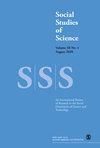Making citizens, procedures, and outcomes: Theorizing politics in a co-productionist idiom.
IF 2.7
2区 社会学
Q1 HISTORY & PHILOSOPHY OF SCIENCE
引用次数: 0
Abstract
The literature engaging political theory in STS often puts forward a deficit model view of STS, in which homegrown STS ideas about politics, such as co-production, are either treated as having an insufficient account of the political or not read as political theory at all. This article challenges the deficit discourse by reading co-production as a full-blown political theory in its own right, in particular by showing how it investigates normative questions of 'the good' that are central to any theorization of politics. Where political theory often concerns itself with the construction and application of universal political ideals-such as of the good citizen, legitimate procedures or smart outcomes-co-production looks at empirical sites where citizens, procedures, and outcomes articulate understandings of the good held by political actors in situ. By looking at the making of citizens, procedures, and outcomes in practice, we can better understand co-production as political theory. In particular, co-production elaborates on how the making of citizens, procedures, and outcomes constitute (and are constituted by) ideal normative positions, including: authoritative views about what citizens may claim to know, culturally-situated understandings of procedural legitimacy, and political values and ideologies embedded in seemingly 'objective' measurements of outcomes.创造公民、程序和结果:在共同生产主义的成语中理论化政治。
STS中涉及政治理论的文献经常提出一种STS赤字模型观点,其中STS关于政治的本土观点,如共同生产,要么被视为对政治的解释不够充分,要么根本不被当作政治理论来解读。本文将共同生产本身作为一种成熟的政治理论来解读,特别是通过展示共同生产如何研究 "善 "的规范性问题(这是任何政治理论化的核心问题)来挑战这种不足论述。政治理论通常关注普世政治理想的构建和应用,如好公民、合法程序或明智结果等,而共同生产则关注公民、程序和结果的实证场所,在这些场所中,政治行动者对 "善 "的理解是现场表达的。通过研究公民、程序和结果在实践中的形成,我们可以更好地理解作为政治理论的共同生产。特别是,共同生产阐述了公民、程序和结果的形成如何构成(以及如何被构成)理想的规范性立场,包括:关于公民可能声称知道什么的权威观点、对程序合法性的文化理解,以及看似 "客观 "的结果测量中所蕴含的政治价值观和意识形态。
本文章由计算机程序翻译,如有差异,请以英文原文为准。
求助全文
约1分钟内获得全文
求助全文
来源期刊

Social Studies of Science
管理科学-科学史与科学哲学
CiteScore
5.70
自引率
6.70%
发文量
45
审稿时长
>12 weeks
期刊介绍:
Social Studies of Science is an international peer reviewed journal that encourages submissions of original research on science, technology and medicine. The journal is multidisciplinary, publishing work from a range of fields including: political science, sociology, economics, history, philosophy, psychology social anthropology, legal and educational disciplines. This journal is a member of the Committee on Publication Ethics (COPE)
 求助内容:
求助内容: 应助结果提醒方式:
应助结果提醒方式:


